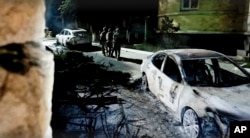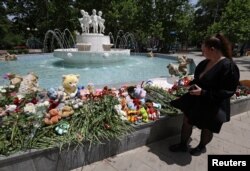Russia stepped up its disinformation efforts to discredit Washington’s support of Ukraine’s self-defense against Russian aggression and label Kyiv as a “terrorist regime.”
The propaganda boost occurs against the backdrop of a potential escalation following Russian President Vladimir Putin’s military treaty with North Korea, which Western analysts say may lead to Pyongyang sending troops to war in Ukraine.
The intensification of Russian anti-Ukraine propaganda also coincides with the start of Kyiv’s negotiations to join the European Union.
Moscow’s disinformation campaign, driven by top government officials, its diplomacy apparatus and the tightly controlled news media, accused, without merit, the United States of orchestrating a “synchronized” assault against its security.
The Kremlin has mixed in a propaganda narrative the recent terrorist attack in Dagestan, a predominantly Muslim North Caucasus republic, and the Ukrainian strikes targeting Russian military bases in occupied Crimea and Sevastopol.
The Institute for the Study of War, a Washington-based think tank, said the long-dormant Wilayat Kavkaz, aka Islamic State Caucasus Province, is now active again and is the likely culprit.
The U.S. disputed Russia’s allegations regarding the strikes in Crimea and Sevastopol, telling VOA that Ukraine seeks to minimize civilian casualties, while Russia’s strikes have been brutal from the beginning.
Yet Russia’s narrative remains unchanged.
Foreign Minister Sergey Lavrov claimed, repeatedly, the attack in Dagestan was “most likely synchronized” with a same-day Ukrainian strike on Russian-occupied Crimea, which he blamed on the U.S.
Russia’s U.N. ambassador, Vassily Nebenzia, echoed his boss’s claim, telling the Security Council, "The USA is directly involved in the terrorist attack in Sevastopol using ATACMS missiles," while failing to back the accusations with evidence.
Other Russian officials and top propagandists amplified the accusations.
An army of anonymous social media users along with the state-controlled news outlets and the Russian embassies worldwide pushed that propaganda message across online platforms, translated into many languages.
Yet Dmitry Rogozin, a far-right politician recently appointed as a senator in Ukraine’s Russian-occupied Zaporizhzhia region, warned against reflexively blaming the West for all of Russia’s internal problems.
The “Kyiv terrorist regime” narrative is nothing novel for Russian propaganda and disinformation.
After Islamic State Khorasan carried out the deadly March 22 terror attack on a concert venue outside of Moscow, killing 145 people, Russian officials and state media also blamed Ukraine, and to a lesser degree NATO.
There is no evidence Ukraine or NATO had any role in that attack, and the U.S. had warned Russia about the threat weeks in advance.
Similarly, Russian officials, including Putin, baselessly blamed Ukraine, and/or the U.S. for anti-Jewish riots in Dagestan last October.
Russia claimed in 2017 to have eliminated the terrorist threat in the North Caucasus. However, some IS-affiliated groups persevered, sporadically carrying out brazen attacks.
Analysts say Russia’s disproportionate targeting of ethnic minorities, including in Dagestan, for mobilization to fight in Ukraine further fueled tensions.
In Dagestan, baseless accusations against the U.S. and Ukraine went further in the past than in the recent terror attacks. When hundreds of Dagestanis rallied against mobilization in September 2022, local politicians said Kyiv and Washington orchestrated the mass protests.






